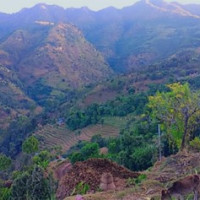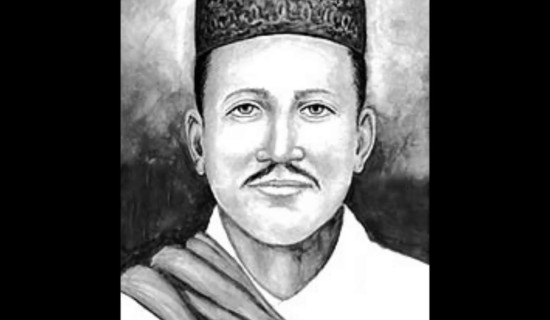- Saturday, 23 August 2025
'Sangrila Dialogue' brings contemporary poets together
By A Staff Reporter,Lalitpur, July 28: O Shatarupa!
Because of your tireless devotion,
Time itself will change its course some day
Society and the world will be transformed—
I feel this with an unwavering faith.
(Translated from Nepali)
When Avinash Shrestha recited this excerpt from his poem on Saturday evening, it felt as if he was returning to his own poetic legacy. His poem titled 'O Shatarupa! Euta Prem Kavita Timra Lagi' (Shatrupa! A Love Poem for You),in many ways stands like a new version of his renowned poem 'Hatma Kalo Phool Liyera Ubhieki Nayikalai'. Here too, the dream of women's liberation is interwoven with a vision of grand human emancipation.
On the same evening at Moksh Bar in Jhamsikhel, a group of young writers, Ken Subedi, Amrita, Aryak Baral, and others, not only announced the upcoming Shangrila Literature Festival but also pledged to host a monthly event titled 'Shangrila Sambad', focused on literature and the arts, as a prelude to the festival.
In the first series of the dialogue, they presented twelve poets from both the senior and younger generations, representing the contemporary Nepali poetry.
Well-known for his 'Boot Polish' movement, poet Shailendra Sakhar raised questions about the crisis of empathy in capitalist America through his poem titled Masanga Prasnaharu Chhan'. Meanwhile, Shrawan Mukarung’s poem "Humansinghko Bhaisi Prem' poignantly described the love a she-buffalo can hold for humankind.
Tanka Upreti reflected on his poetic journey and recited a brief yet moving poem titled 'Bookmark.'
Geeta Tripathi, in her poem 'Euta Suryodaya,' reminisced about her father’s contribution as a teacher. Jyoti Jungle expressed gratitude to all those who contributed to the progress of human civilisation through her poem 'Dhanyabad.'
Avaya Shrestha’s celebrated poem 'Aadhar' (The Basis) offered a soulful expression of love. The metaphor of a heart's tender corner being preserved like a feather of a peacock tucked in the centerfold of a book was moving.
In her poem 'Sarbajanik Busma Ek Din' (One Day on a Public Bus), Bimala Tumkhewa portrayed the touching daily struggles of a middle-class woman, while Shakuntala Joshi, in 'Barko Bot', voiced concern over the fading identity of indigenous peoples and the destruction of nature.
The poems of Bina Thing Tamang and Deepak Sapkota were rich in narrative form. Ending of both poems were amazing. Sapkota poignantly shared how he saw the image of his late grandmother in his own daughter, and Tamang powerfully expressed how, after enduring extreme oppression, she had transformed from a red rhododendron into a black one.
Earlier in the event, poet Ramesh Kshitij had conducted an engaging conversation with Tulsi Diwas about his poetry and love for folk culture. "A poet must write with honesty towards relative truths," said Diwas. “The same path that goes uphill for someone climbing becomes a downhill path for someone descending. This is the relativity of truth.” Kshitij also unveiled many little-known aspects of Diwas’s life during the session.

















